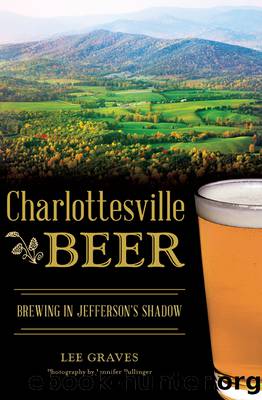Charlottesville Beer by Graves Lee;Pullinger Jennifer;

Author:Graves, Lee;Pullinger, Jennifer;
Language: eng
Format: epub
Publisher: Arcadia Publishing Inc.
Published: 2017-08-15T00:00:00+00:00
Mary Wolf and her son, Danny, have shepherded the growth of Wild Wolf Brewing Company from a small homebrew shop to a restaurant, bar and event site in Nellysford. Photo by Lee Graves.
Both are available in cans, as are Blonde Hunny and several other beers. Like many craft breweries, Wild Wolf is taking advantage of the increased acceptance of cans among consumers. About two-thirds of the breweryâs annual productionâabout 4,100 barrelsâgoes into packaging, with the rest in kegs to be sold on draft. âWhen we first went into cans, our distributor was like, âYou arenât going to sell any beer,ââ Wolf said. âWe got our own canning machine in July [2015]. So weâre canning sometimes three times a week. Weâre putting a lot of beer in cans.â
Wild Wolf was the first Virginia craft brewery picked up by Loveland Distributing Company, based in Richmond. That association has led to some interesting offshootsâspecially brewed batches for the Richmond Folk Festival, the Richmond Kickers soccer team and other partnerships. Those have broadened the breweryâs exposure, as have the busloads of tourists exploring the beers, ciders, wines and distilled spirits in Nelson County. Most times, the Wild Wolf stop is sandwiched between Blue Mountain Brewery in the shadow of Afton Mountain and Devils Backboneâs Basecamp Brewpub & Meadows below Wintergreen. âEach of the three breweries is incredibly different, which I think makes it awesome because thereâs a good reason to try each one,â Wolf said. âWe all have amazing beer, and weâre all doing things just a little differently.â
Unlike the other two, Wild Wolf has no second production facility, and expansion was definitely under consideration in 2015. Brewing on the fifteen-barrel system has been pushed to its capacity, the main sixty-barrel fermenter is filled as soon as itâs emptied and five trailers are used for storage on the ten acres. âWe have pushed the limits as far as we can push them,â Wolf said, âso we know in a couple of years weâll have a new brewery.â
Still, the acreage has room for hops, spices, produce and chickens that go into the beer and food. Plus, the restaurant embraces the âfarm to tableâ concept by supporting local farms, not only by purchasing goods but also by supplying spent grain to cattlemen.
Part of Wild Wolf âs success comes from the accessibility of easy-drinking beers like Blonde Hunny. Itâs called a gateway beer, a door that opens for the Bud-Miller-Coors drinkers who are tasting their first craft beer. Or for wine enthusiasts whose palates are more accustomed to the tannins of grapes than the esters of ales.
Wolf herself once preferred wine to beer. She and her husband were regulars on vineyard tours, and they still have a three-thousand-bottle cellar. âBut I donât drink wine anymore. I made a complete switch,â she said. âI just have fallen head over heels in love with beer. Beer is just fine for me.â¦As an ex-wine drinker, what I mostly loved about wine was the variety, and that you could have different wines from different parts of the world.
Download
This site does not store any files on its server. We only index and link to content provided by other sites. Please contact the content providers to delete copyright contents if any and email us, we'll remove relevant links or contents immediately.
Life 3.0: Being Human in the Age of Artificial Intelligence by Tegmark Max(5558)
The Sports Rules Book by Human Kinetics(4388)
The Age of Surveillance Capitalism by Shoshana Zuboff(4293)
ACT Math For Dummies by Zegarelli Mark(4049)
Unlabel: Selling You Without Selling Out by Marc Ecko(3663)
Blood, Sweat, and Pixels by Jason Schreier(3625)
Hidden Persuasion: 33 psychological influence techniques in advertising by Marc Andrews & Matthijs van Leeuwen & Rick van Baaren(3565)
The Pixar Touch by David A. Price(3439)
Bad Pharma by Ben Goldacre(3428)
Urban Outlaw by Magnus Walker(3396)
Project Animal Farm: An Accidental Journey into the Secret World of Farming and the Truth About Our Food by Sonia Faruqi(3221)
Kitchen confidential by Anthony Bourdain(3090)
Brotopia by Emily Chang(3056)
Slugfest by Reed Tucker(3004)
The Content Trap by Bharat Anand(2927)
The Airbnb Story by Leigh Gallagher(2857)
Coffee for One by KJ Fallon(2638)
Smuggler's Cove: Exotic Cocktails, Rum, and the Cult of Tiki by Martin Cate & Rebecca Cate(2541)
Beer is proof God loves us by Charles W. Bamforth(2463)
